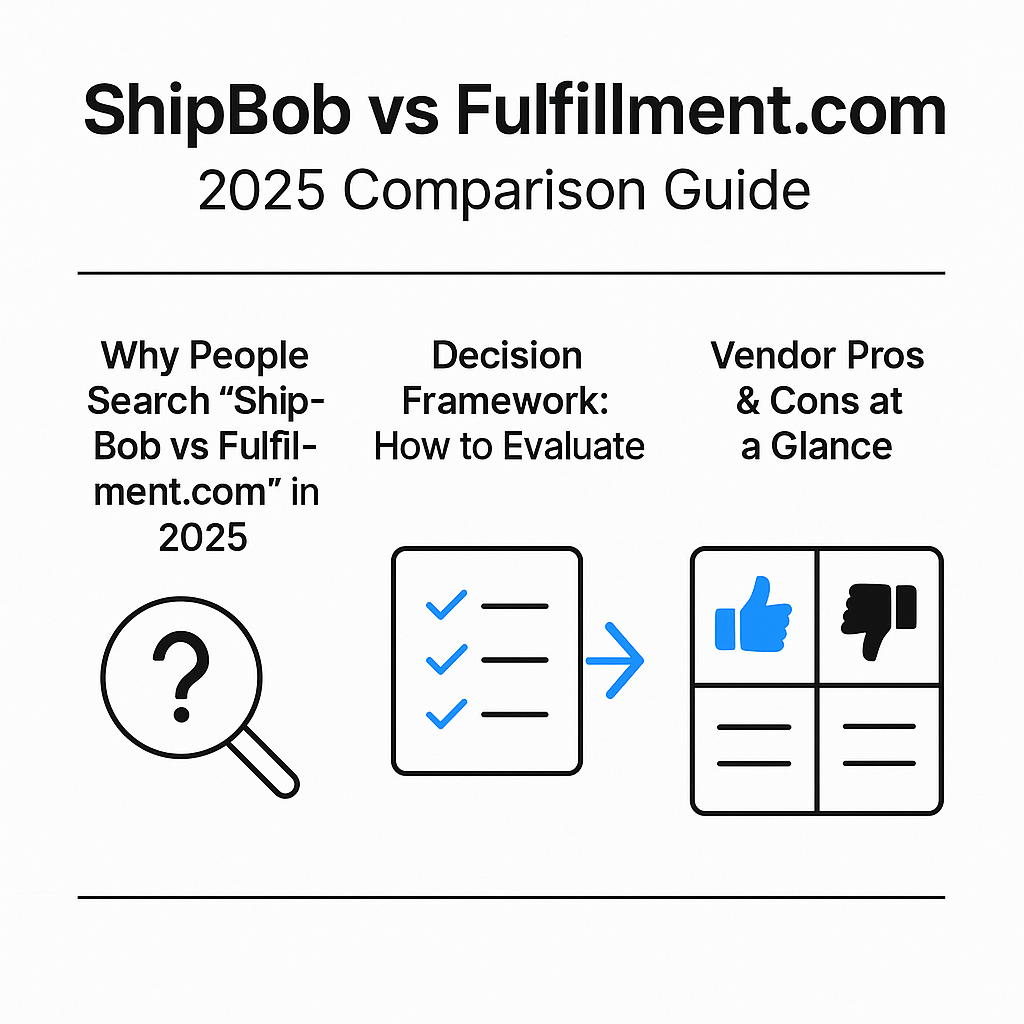
ShipBob vs Fulfillment.com
In the rapidly evolving world of ecommerce logistics, choosing the right third-party logistics (3PL) partner can make or break your business. As logistics managers and ecommerce founders weigh their options, the decision often boils down to ShipBob vs Fulfillment.com. This comprehensive guide will help you navigate this choice by comparing key aspects like pricing, features, and onboarding processes.
Why People Search ‘ShipBob vs Fulfillment.com’ in 2025
As ecommerce continues to expand globally, the need for efficient, reliable logistics solutions has never been greater. In 2025, businesses are increasingly focusing on sustainability, AI-driven forecasting, and cost-effective multi-node fulfillment strategies. These trends are driving logistics managers to compare 3PL providers like ShipBob and Fulfillment.com, who are both adapting to these demands.
- Consider sustainability initiatives; both companies are investing in greener logistics solutions.
- Evaluate AI capabilities for demand forecasting and inventory management.
- Assess multi-node fulfillment options to reduce shipping times and costs.
Decision Framework: How to Evaluate
When comparing ShipBob vs Fulfillment.com, it’s crucial to establish a decision framework that aligns with your business goals. Start by identifying the key criteria that matter most to your operations, such as cost, speed, and reliability. Then, map these criteria to the capabilities of each provider.
Both ShipBob and Fulfillment.com offer robust solutions, but their strengths vary. ShipBob is known for its user-friendly platform and extensive US network, while Fulfillment.com excels in international reach and scalability.
- Define your primary logistics goals: cost reduction, speed, or customer experience.
- Match your goals with each provider’s strengths: ShipBob for domestic, Fulfillment.com for international.
- Consider the scalability of their solutions as your business grows.
Vendor Pros & Cons at a Glance
- ShipBob Pros: User-friendly platform, extensive US network, transparent pricing.
- ShipBob Cons: Limited international reach, potential for higher costs with complex SKUs.
- Fulfillment.com Pros: Strong international presence, scalable solutions, advanced tech integration.
- Fulfillment.com Cons: Higher initial setup costs, complex onboarding process.
Analyzing these pros and cons, ShipBob is ideal for businesses focusing on the US market with straightforward logistics needs, while Fulfillment.com is better suited for companies looking to expand internationally with complex logistics requirements.
Pricing & Total Landed Cost: What Really Moves the Number
Understanding the pricing structures of ShipBob and Fulfillment.com is essential to determine the total landed cost of your logistics operations. Both providers offer transparent pricing models, but they differ in terms of cost components and flexibility.
- ShipBob offers transparent, all-inclusive pricing with no hidden fees, ideal for predictable budgeting.
- Fulfillment.com provides flexible pricing with volume discounts, beneficial for scaling businesses.
- Consider additional costs like storage fees, pick-and-pack charges, and shipping rates.
While ShipBob’s pricing is straightforward, Fulfillment.com’s flexibility can lead to cost savings for businesses with fluctuating volumes or international shipping needs.
Feature-by-Feature Comparison
- Network Coverage: ShipBob excels in the US, while Fulfillment.com has a stronger international presence.
- Technology Integration: Both offer robust tech platforms, but Fulfillment.com provides more advanced integrations for complex operations.
- Customer Support: ShipBob offers 24/7 support, whereas Fulfillment.com provides dedicated account managers for personalized service.
In this feature-by-feature comparison, ShipBob is more suited for businesses prioritizing domestic logistics and straightforward tech integration, while Fulfillment.com is ideal for those needing advanced tech solutions and international reach.
Scenario Playbook: Who Should Choose What?
- US-Based Startups: ShipBob offers a seamless, cost-effective solution for startups focusing on the US market.
- International Expansion: Fulfillment.com is the go-to for businesses planning to expand globally with complex logistics needs.
- High-Volume Ecommerce: Fulfillment.com’s scalable solutions and volume discounts make it ideal for high-volume sellers.
Choosing between ShipBob and Fulfillment.com depends on your specific business scenario. For US-focused startups, ShipBob is a natural fit, while Fulfillment.com is better for international expansion and high-volume ecommerce operations.
Onboarding & Risk Mitigation
Onboarding with a new 3PL can be a daunting task, but both ShipBob and Fulfillment.com offer structured processes to ease the transition. ShipBob’s onboarding is straightforward, with a focus on quick setup and user-friendly interfaces. In contrast, Fulfillment.com requires a more detailed setup, reflecting its complex capabilities and international focus.
- ShipBob provides a quick setup process, ideal for businesses looking to start operations swiftly.
- Fulfillment.com offers detailed onboarding, beneficial for businesses with complex logistics needs.
- Both providers offer risk mitigation strategies, including inventory management and demand forecasting tools.
While ShipBob offers a faster onboarding process, Fulfillment.com’s detailed setup ensures a tailored solution for businesses with specific needs.
Expert Take
Having consulted with numerous ecommerce businesses, I’ve seen the impact of choosing the right 3PL first-hand. One client, a mid-sized apparel company, initially chose ShipBob for its user-friendly platform and US focus. As they expanded internationally, they transitioned to Fulfillment.com to leverage its global network and advanced tech integrations. This strategic shift not only improved their delivery times but also enhanced their customer satisfaction globally.
Further Reading
FAQs
How do pricing models differ for ‘ShipBob vs Fulfillment.com’?
ShipBob offers transparent, all-inclusive pricing, while Fulfillment.com provides flexible pricing with volume discounts, suitable for scaling businesses.
What support model should I expect?
ShipBob offers 24/7 support, whereas Fulfillment.com provides dedicated account managers for personalized service.
Which industries benefit most?
ShipBob is ideal for US-based startups and straightforward ecommerce operations, while Fulfillment.com suits international and high-volume businesses.
How long does onboarding take?
ShipBob’s onboarding is quick and straightforward, while Fulfillment.com’s process is more detailed, reflecting its complex capabilities.
Can multi-node reduce both cost and transit time?
Yes, both providers offer multi-node fulfillment options that can reduce shipping costs and transit times.
Next Steps
Ready to make your choice? Compare quotes from ShipBob and Fulfillment.com or schedule a consultation to discuss your logistics needs in detail.

Leave a Reply